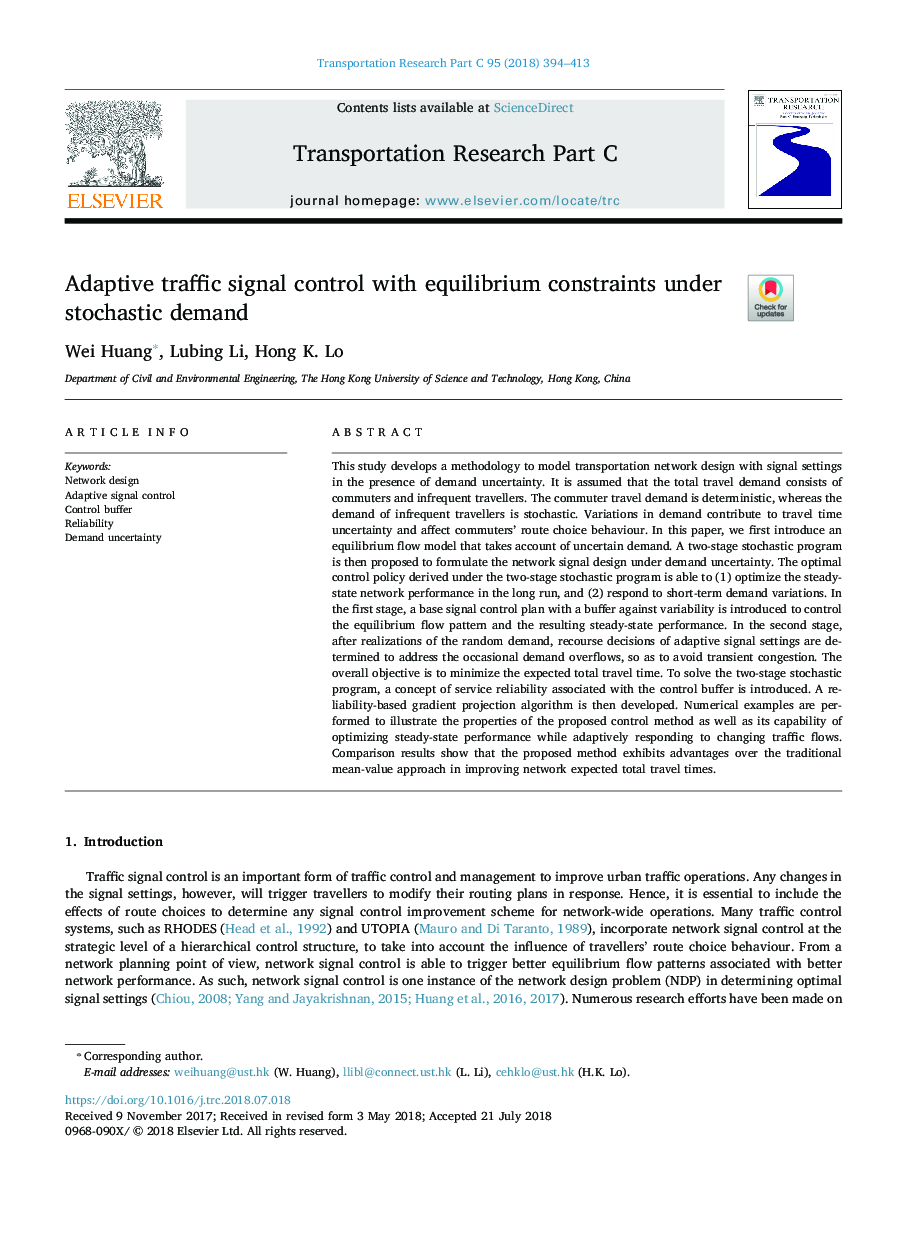| کد مقاله | کد نشریه | سال انتشار | مقاله انگلیسی | نسخه تمام متن |
|---|---|---|---|---|
| 6935690 | 1449654 | 2018 | 20 صفحه PDF | دانلود رایگان |
عنوان انگلیسی مقاله ISI
Adaptive traffic signal control with equilibrium constraints under stochastic demand
ترجمه فارسی عنوان
کنترل ترافیک تطبیقی با محدودیت های تعادلی تحت تقاضای تصادفی
دانلود مقاله + سفارش ترجمه
دانلود مقاله ISI انگلیسی
رایگان برای ایرانیان
کلمات کلیدی
طراحی شبکه، کنترل سیگنال سازگار، بافر کنترل قابلیت اطمینان، عدم قطعیت تقاضا،
ترجمه چکیده
این مطالعه یک روش برای طراحی مدل شبکه حمل و نقل با تنظیمات سیگنال در صورت عدم قطعیت تقاضا را توسعه می دهد. فرض بر این است که کل تقاضای سفر شامل مسافران و مسافران نادر است. تقاضای مسافرت سفر قطعی است، در حالی که تقاضای مسافران نادر است تصادفی است. تغییرات در تقاضا موجب عدم اطمینان زمانی سفر می شود و بر رفتار رفت و آمد مسافران تاثیر می گذارد. در این مقاله ابتدا یک مدل جریان تعادلی معرفی می کنیم که در آن تقاضای نامطلوب را مورد توجه قرار می دهد. سپس یک برنامه دو مرحله ای تصادفی برای طراحی سیگنال شبکه در زیر عدم اطمینان تقاضا پیشنهاد می شود. سیاست کنترل مطلوب مشتق شده در برنامه دو مرحله ای احتمالا (1) بهینه سازی عملکرد شبکه حالت پایدار در دراز مدت و (2) پاسخ به تغییرات تقاضای کوتاه مدت است. در مرحله اول، یک طرح کنترل سیگنال پایه با یک بافر در برابر تغییرپذیری برای کنترل الگوی جریان تعادل و عملکرد پایدار ساخته شده معرفی شده است. در مرحله دوم، پس از تحقق تقاضای تصادفی، تصمیم گیری های گزینشی از تنظیمات سیگنال تطبیقی برای حل کردن سرریز تقاضای گاه به گاه، برای جلوگیری از احتقان گذرا تعیین می شود. هدف کلی این است که کل زمان سفر مورد انتظار را به حداقل برساند. برای حل برنامه دو مرحله ای تصادفی، یک مفهوم قابلیت اطمینان سرویس مرتبط با بافر کنترل معرفی شده است. سپس یک الگوریتم پیش بینی شیب مبتنی بر قابلیت اطمینان ایجاد می شود. نمونه های عددی برای نشان دادن خواص روش کنترل پیشنهادی و نیز قابلیت آن برای بهینه سازی عملکرد حالت پایدار در حالی که سازگارانه با تغییرات جریان ترافیک پاسخ می دهند، انجام می شود. نتایج مقایسه نشان می دهد که روش پیشنهاد شده مزایایی را نسبت به رویکرد میانگین ارزش سنتی در بهبود کل زمان سفر مورد انتظار شبکه نشان می دهد.
موضوعات مرتبط
مهندسی و علوم پایه
مهندسی کامپیوتر
نرم افزارهای علوم کامپیوتر
چکیده انگلیسی
This study develops a methodology to model transportation network design with signal settings in the presence of demand uncertainty. It is assumed that the total travel demand consists of commuters and infrequent travellers. The commuter travel demand is deterministic, whereas the demand of infrequent travellers is stochastic. Variations in demand contribute to travel time uncertainty and affect commuters' route choice behaviour. In this paper, we first introduce an equilibrium flow model that takes account of uncertain demand. A two-stage stochastic program is then proposed to formulate the network signal design under demand uncertainty. The optimal control policy derived under the two-stage stochastic program is able to (1) optimize the steady-state network performance in the long run, and (2) respond to short-term demand variations. In the first stage, a base signal control plan with a buffer against variability is introduced to control the equilibrium flow pattern and the resulting steady-state performance. In the second stage, after realizations of the random demand, recourse decisions of adaptive signal settings are determined to address the occasional demand overflows, so as to avoid transient congestion. The overall objective is to minimize the expected total travel time. To solve the two-stage stochastic program, a concept of service reliability associated with the control buffer is introduced. A reliability-based gradient projection algorithm is then developed. Numerical examples are performed to illustrate the properties of the proposed control method as well as its capability of optimizing steady-state performance while adaptively responding to changing traffic flows. Comparison results show that the proposed method exhibits advantages over the traditional mean-value approach in improving network expected total travel times.
ناشر
Database: Elsevier - ScienceDirect (ساینس دایرکت)
Journal: Transportation Research Part C: Emerging Technologies - Volume 95, October 2018, Pages 394-413
Journal: Transportation Research Part C: Emerging Technologies - Volume 95, October 2018, Pages 394-413
نویسندگان
Wei Huang, Lubing Li, Hong K. Lo,
